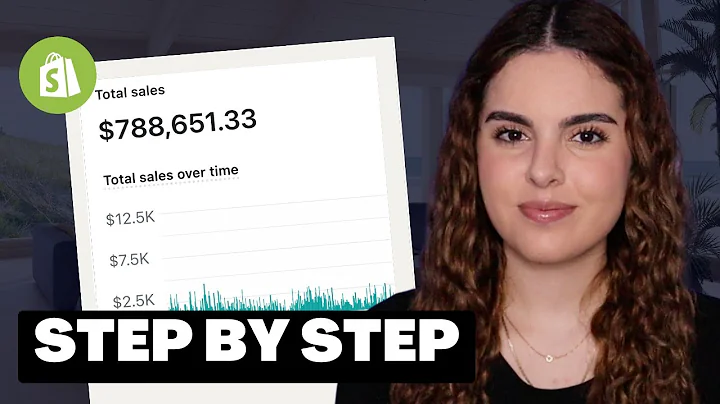Mastering Dropshipping Taxes
Table of Contents:
- Introduction
- The Importance of Paying Taxes for dropshipping
- Sole Proprietorship vs. LLC: Deciding on Business Formation
- Understanding Profit and Taxes
4.1. Calculating Profit for Dropshipping Stores
4.2. Federal and State Income Tax
- Minimizing the Risk of Getting Audited
5.1. Keeping Track of Expenses
5.2. Providing Proof to the Government
- Sales Tax and Dropshipping
6.1. Not Charging Sales Tax for Direct Shipping from Suppliers
6.2. Customs Fees and Declarations
- Conclusion
The Importance of Paying Taxes for Dropshipping
Dropshipping has become a popular business model in recent years, allowing entrepreneurs to start their own online stores without the need for inventory. However, one important aspect that many budding dropshippers overlook is the responsibility of paying taxes. In this article, we will explore the significance of tax compliance for dropshippers and provide useful insights for navigating the tax landscape.
Introduction
When venturing into the world of dropshipping, it is crucial to understand the legal and financial obligations associated with running a business. Taxes are an inevitable part of any business, and failure to comply with tax regulations can lead to serious consequences. As an aspiring dropshipper, it is essential to educate yourself about the tax requirements applicable to your business to avoid potential penalties or legal issues in the future.
Sole Proprietorship vs. LLC: Deciding on Business Formation
Before diving into the intricacies of tax obligations, it is important to consider the structure of your business. As a dropshipper, you have the option to start as a sole proprietor or form a limited liability company (LLC). Each option has its own advantages and considerations, but it is generally recommended to begin as a sole proprietor when starting out. This allows you to operate your business using your Social Security number and simplifies the initial setup process.
Creating an LLC or incorporating your business can be a valuable step once you have gained momentum and established a steady stream of revenue. This protects your personal assets and provides additional tax benefits, but it is not necessary in the early stages of dropshipping.
Understanding Profit and Taxes
One of the fundamental aspects of paying taxes as a dropshipper is understanding how profit is calculated and how taxes are applied. Unlike traditional businesses that have inventory costs to account for, dropshipping relies on a simple equation: revenue minus costs equals profit.
To calculate your profit accurately, it is crucial to account for all relevant costs, including advertising expenses, product fees, and other overheads. Once you have determined your profit, you will need to pay federal income tax and, depending on your location, possibly state income tax as well. It is advisable to consult with a tax professional to determine the exact tax obligations specific to your situation.
Minimizing the Risk of Getting Audited
Getting audited by the government can be a daunting and time-consuming process. To minimize this risk, it is essential to keep track of all your business transactions and maintain proper records. The key to successfully navigating an audit is providing proof of your business expenses and justifying their relevance.
By diligently keeping receipts, invoices, and other relevant documentation, you can provide the government with the necessary evidence to support your tax deductions and expense claims. Being proactive and organized can go a long way in reducing the chances of being audited and ensuring smooth sailing during tax season.
Sales Tax and Dropshipping
Sales tax can be a complex subject for dropshippers. Unlike businesses that have physical inventory, dropshippers often don't handle or store products themselves. This creates unique considerations when it comes to sales tax obligations.
For dropshippers who source products directly from suppliers and have them shipped to customers, sales tax is usually not charged or collected. The responsibility for sales tax lies with the supplier, who is considered the party making the sale. However, it is important to note that customs fees and declarations may apply when shipping products from overseas, and these should be taken into account when calculating expenses.
Conclusion
Paying taxes is an essential part of running a dropshipping business. By understanding the different aspects of taxation, such as calculating profit, choosing the right business formation, and keeping accurate records, dropshippers can navigate the tax landscape with confidence. Remember to consult with a tax professional for personalized advice and stay updated with the latest tax regulations in your jurisdiction. Compliance not only ensures peace of mind but also establishes a solid foundation for long-term success in the world of dropshipping.
Highlights:
- Understanding the importance of paying taxes for dropshipping businesses
- Choosing the right business formation: sole proprietorship vs. LLC
- Calculating profit and navigating federal and state income tax obligations
- Minimizing the risk of government audits through meticulous record-keeping
- Sales tax considerations for dropshippers and the role of suppliers
- Tips for maintaining tax compliance and seeking professional advice
FAQ:
Q: Do I need to register my dropshipping business as an LLC immediately?
A: No, starting as a sole proprietor is recommended initially. Consider forming an LLC or incorporating your business once you have established a solid foundation and consistent revenue stream.
Q: How do I calculate profit for my dropshipping business?
A: Profit is calculated by subtracting all relevant costs, such as advertising expenses and product fees, from your total revenue.
Q: Should I charge sales tax for my dropshipped products?
A: For products sourced directly from suppliers and shipped to customers, the responsibility for sales tax usually lies with the supplier. However, it is important to consider customs fees and declarations when calculating expenses.
Q: What steps can I take to minimize the risk of getting audited?
A: Keeping meticulous records, including receipts and invoices, is crucial. Maintaining proof of your business expenses will help justify deductions and demonstrate compliance during an audit.



















